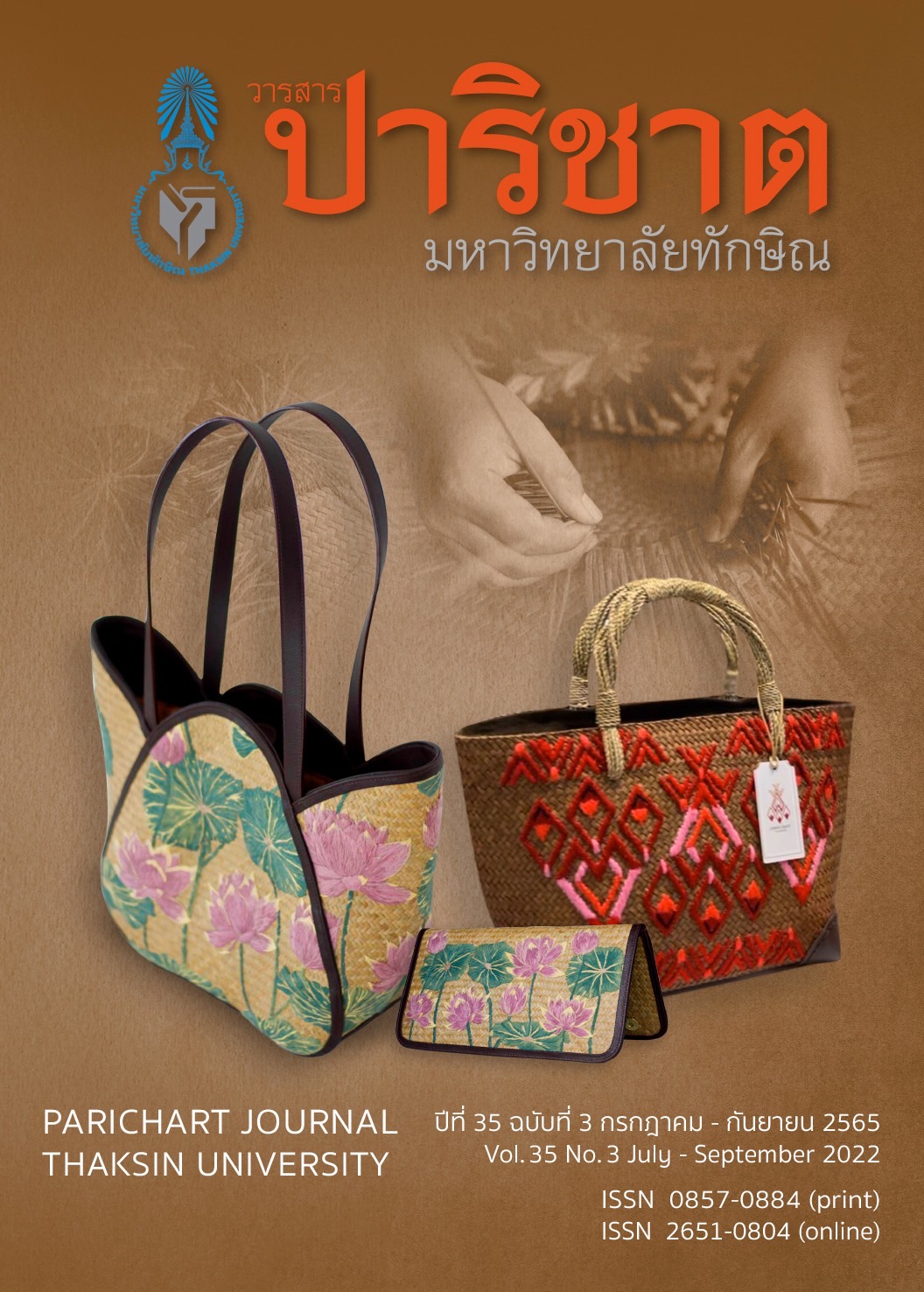The Influence of Creativity on Students in Faculty of Information and Communication Technology, Silpakorn University
Main Article Content
Abstract
The objectives of this research were 1) to examine the relationship between creativity, perceived the university support for creativity, and 5 personality factors of students at Faculty of Information and Communication Technology, Silpakorn University and 2) to explore the factors influence the students’creativity. The study was quantitative research. The instrument of this research was a questionnaire for data collection used with 329 students. The statistical methods in the research included the coefficient of Pearson Product Moment Correlation analysis and Stepwise Multiple Regression analysis. The research results indicated that 1) creativity had positive correlation with their perception on the university support for the creativity and the 5 personality factors and 2) four factors affecting creativity of the students were as follows (1) overall perceived university support for creativity, (2) compromising personality, (3) openness to experience personality and (4) Neuroticism personality.
Article Details

This work is licensed under a Creative Commons Attribution-NonCommercial-NoDerivatives 4.0 International License.
References
Chainuwat, A. (2018). Moving forward in Thailand: Cabinet resolution, Prople’s Edition. https://www.youtube.com/watch?v=mzwKOT0m4GE.
Kittisaknawin, C. (2014). Factors Influencing Individual Creativity: A Study of Undergraduate Students, Silpakorn University, Phetchburi IT Campus. [ICT campus’s Fund for Research and Development (2012), Silpakorn University]. National Research Council of Thailand (NRCT).
Blaskova, M. (2014). Influencing Academic Motivation, Responsibility and Creativity. Procedia – Social and Behavioral Sciences, 159(2014). 415-425. https://doi.org/10.1016/j.sbspro.2014.12.399.
Marquis, E., & Vajoczki, S. (2012). Creative differences: Teaching creativity across the disciplines. international journal for the scholarship of teaching and learning, 6(1). 1-7. DOI:10.20429/ijsotl.2012.060106.
Kittisaknawin, C., Techaniyom, K., Arakpothchong., & Pakshananda, P. (2019). The influence of spiritual quotient (SQ)affecting individual creativity of sagha administrative monks. [Paper presentation]. The 5th National Conference on Management Science, Udon thani.
Tuntrabundit, K. (2018). Innovation and creativity management. Khon Kaen Printing.
Wongkasem, K. (2018). Creativity for value management. Bangkok Press.
Panyapee, P. (2016). Creative thinking development subject number 3400 - 1003. http://www.phuketvc.ac.th/download/61/Study2.pdf?fbclid=IwAR04r25jRJcwUIQEOvT5WYkPIqudurrWygVu4w44wg-Nyo0OC0Itk01cY4c.
Kittisaknawin, C. (2016). Individual creativity of silpakorn university’s staffs. [Types of creative research projects for develop a new generation of researchers for the year 2013 under the supervision of the research and development institute, Silpakorn University].
Kittisaknawin, C. (2011). A study of relationship between the perceived organizational support for creativity, creative self-efficacy and individual creativity. [Paper presentation]. 2011 SPUC National Conference. Chon Buri. [Unpublished Master’s Thesis, Silpakorn University].
Teppanich, T. (2017). The relationships of perceived organizational support and organizational citizenship behavior of government officers under the areaRevenue office in Nakhon Ratchasima. [Master of Business Administration, Independent Studies, Rajamangala University of Technology Isan].
Lomlao, P. (2015). The influence of perceived human resources development support to organizationl citizenship behavior through affective Commitment of Employees of TPI Polene Public Company Limited Saraburi Province. [Unpublished Master’s Thesis, Silpakorn University].
Rattanajirundorn, K. (2013). Emotional quotient, personality (Big 5) the effect of moral reasoning of staff in Department of Heath Service Support, Ministry of Public Health. [Unpublished Master’s Thesis, Silpakorn University].
Udomchaipattanakit, M (2015). Life skills, five factor model, and organization climate affecting the quality development involvement of private company employees in Bangkok. [Unpublished Master of Business Administration, Independent Studies, Bangkok University].
Puangmee, N. (2011). Big five factor, perceived organization culture of nurses in a University Hospital. [Unpublished Master’s Thesis, Thammasat University].
Vanichbuncha, K. (2004). Statistics. 7th edition. Chulalongkorn University Printing House.
Pasunon, P. (2018). Teaching documents statistics for research: analysis by SPSS with example. faculty of management science Silpakorn University.
Kittisaknawin, C. (2011). Factors influencing individual creativity. [Paper presentation]. The National SMARTS Conference I. Bangkok.
Saiyod, L., & Saiyod, A. (2000). Psychological measurement. Suwiriyasan.
Tiasuwan, T. (2003). The relationship between the five elements of personality part of the job, perception, organizational atmosphere, and performance of supervisors in industrial plants electronics. [Unpublished Master’s Thesis, Kasetsart University].
Srithong, C. (2004). Relationships between leaders, personality, service attitudes and performance. of the bank's middle management. [Unpublished Master’s Thesis, Thammasat University].
Kittisaknawin, C. (2014). Factors influencing individual creativity: A study of undergraduate students, silpakorn university, Phetchburi IT Campus. [ICT campus’s Fund for Research and Development (2012), Silpakorn University]. National Research Council of Thailand (NRCT).
Diliello, T.C., Houghton, J.D., & Dawley D. (2011). Narrowing the creativity gap: The moderating effects of perceived support for creativity. The journal of psychology interdisciplinary and applied, 145(3). 151-172. DOI:10.1080/00223980.2010.548412


